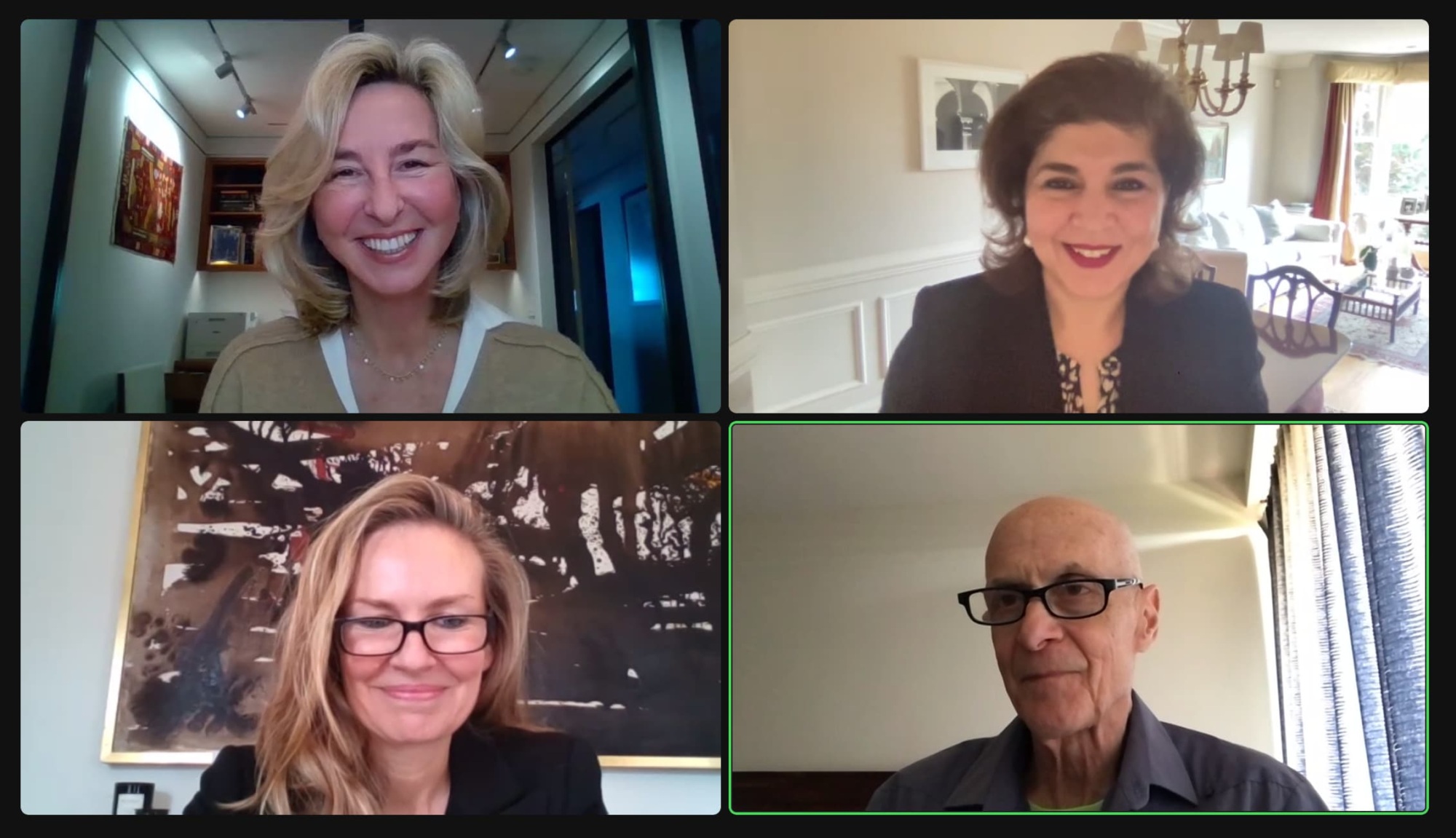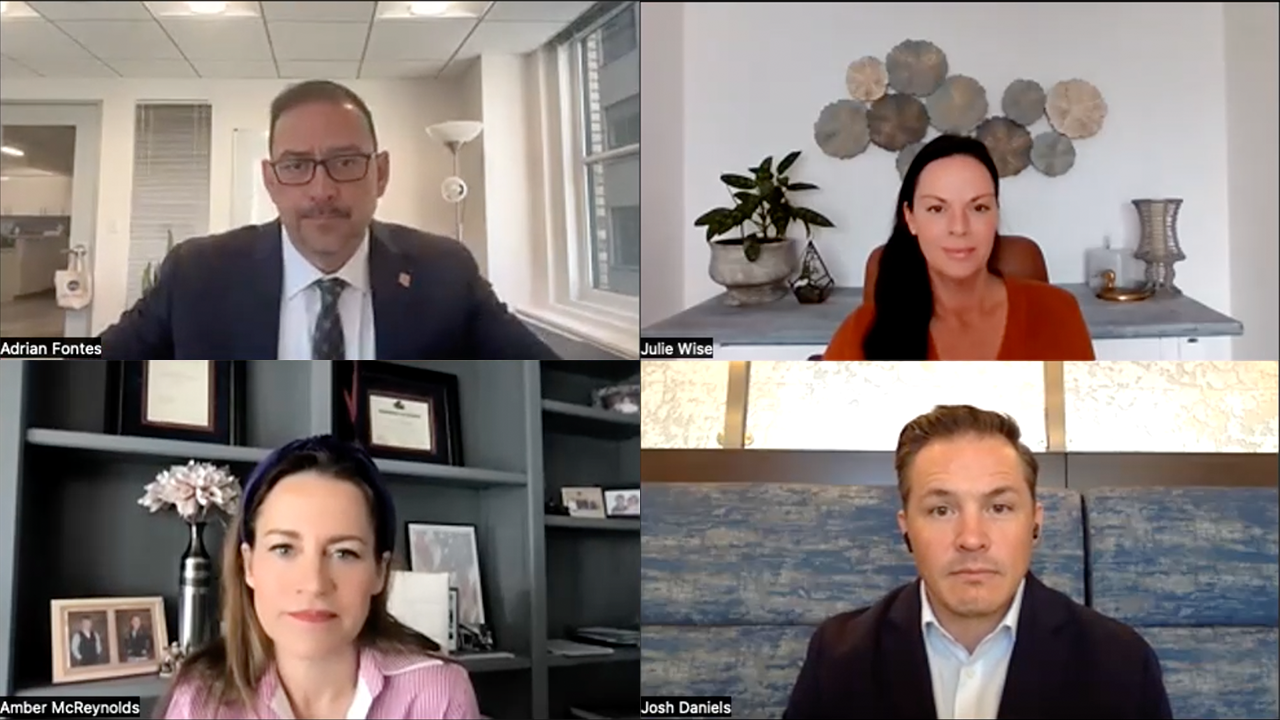
Event Recaps
Experts discuss how social media’s design radicalizes its users
Social media platforms are designed to maximize our attention, suck us in, and keep us hooked. They do this by keeping the public in the dark about how algorithms elevate…
Event Recaps
This week, Issue One and its National Council on Election Integrity convened leading experts for a conversation about the root causes and impact disinformation is having on our democracy, and the bold solutions our government and corporations can take to combat this growing threat.
Moderated by Issue One’s CEO and Founder Nick Penniman, panelists included Vanessa Cárdenas, President, CárdenasStrategies, LLC, Chloe Colliver, Head of Digital Policy and Strategy, Institute for Strategic Dialogue, Gordon Crovitz, Co-Founder and Co-CEO of NewsGuard, and Ben Scott, Executive Director, Reset and Policy & Advocacy Advisor, Luminate.
A full recording of the event is available here, and a transcript can also be found here.
Penniman set the stage by classifying disinformation as “among the greatest threats facing our democracy today,” with the power to “destabilize governments, sow discord, and undermine the truth.”
The world witnessed that threat become a reality when a mob stormed the U.S. Capitol on January 6 following months of false allegations that the presidential election had been stolen.
How did we get to this point, and where do we go from here?
“The bar for entry to this kind of activity online now is extremely low, and the tactics and toolkits to disinformation are out there for all to pick up and utilize at their ease,” Chloe Colliver said. “It’s hard to put across quite how grave the situation is and how systemic a problem this is.” Looking ahead to upcoming elections in Germany and France, for example, Colliver warned that “the playbook from the disinformation activities that took place in the U.S. last year has already been picked up and shared with international compatriots in extremist movements in populist political parties and beyond. We will, no doubt, see a mirroring of the attempt to undermine faith in democratic practices and other democracies.”
The role that social media platforms play in the spread of disinformation must also be addressed. According to Ben Scott, disinformation is frequently amplified artificially across these platforms by algorithms that favor provocative, engaging content that’s hard to look away from, all of which are important factors that drive revenue and advertising dollars. “These extreme views, the conspiracy theories, have come from the margins of the public sphere and they’ve been dragged into the middle and they’ve been distorted vastly out of proportion to the views that are actually held in the real world,” Scott said. “They take really provocative, sensational, outrageous content — like, ‘the election was stolen!’ — and they move it into the middle of the public sphere, and they show it to us over and over and over again. Captures our attention; makes them money. But what it also does is normalizes those extreme views… and what you get after a while is a large number of people who believe in an alternative reality.”
The panelists argued that when it comes to regulation and liability, the current conversation in the United States is missing the mark compared to places like Canada, Australia, the UK, and other European countries. The debate in America “has devolved into a food fight over who’s side gets biased more by the social media platforms” Ben Scott said, noting that the often talked about Section 230 is only relevant for a narrow slice of content and doesn’t adequately address the crisis at hand. “We need a separate conversation to talk about how to deal with the problem of distortion, the problem of manipulation, of deception, of an information market built on surveillance of every internet user to determine what pushes their buttons and to feed them that kind of content.”
Gordon Crovitz noted that it’s very difficult for people to resolve disinformation on their own. “Giving people tools for them to make up their own minds is far superior than a kind of heckling fact-checking.” Icons on social media indicating whether information is generally trustworthy or not are practical tools that can help people pay closer attention to the credibility of the source. “The great challenge is how to break through the walled garden of these digital platforms” so that consumers can arm themselves with solutions. Crovitz co-founded NewsGuard, which rates the credibility of news and information outlets online.
When it comes to President Trump, one of the most influential and prolific spreaders of disinformation, his ultimate “de-platforming” in the wake of January 6 was a “good thing,” according to Vanessa Cárdenas. “He was such a big driver of disinformation, and really harmful disinformation. In terms of the impact… ever since he’s been gone from the platforms, the conversation has been more sane. Focused on policy, focused on solutions, versus what the latest tweets have been.” Underscoring the argument that Trump was a symptom and not a cause of disinformation, Cárdenas reiterated that he has “unleashed this new way of communicating and creating havoc and distrust. And the harms are real.”
The experts agreed that reducing the grip of disinformation will require a host of solutions.
“The vacuum of really good sources of information, whether it’s print, whether it’s radio, it’s really creating havoc particularly in vulnerable communities,” Vanessa Cárdenas said, urging that we must make significant investments in how we communicate and educate people on how to be better consumers of information. That includes meeting people where they are (on platforms such as Facebook) and lifting up validators who can effectively speak to vulnerable communities.
Gordon Crovitz concluded: “What really needs funding is old-fashioned journalism.”
This week’s event was the second in a series of conversations hosted by Issue One’s National Council on Election Integrity, intended to offer an honest and productive bipartisan lens to some of the most contentious election related issues. The next conversation, which will focus on the Electoral Count Act, will take place next month.
Event Recaps
Social media platforms are designed to maximize our attention, suck us in, and keep us hooked. They do this by keeping the public in the dark about how algorithms elevate…
Event Recaps
On October 23rd, 2023 in Washington, D.C., Issue One held an event to kick off Safe Tech, Safe Kids — a campaign partnership led by Project Liberty in collaboration with Issue…
Event Recaps
Issue One convenes election officials for webinar on the impact of high election administrator turnover on 2024, as Faces of Democracy members testify before the Senate about threats to elections...
Yesterday, Issue One hosted a virtual event with current and former election officials providing further insights from our recent “High Cost of High Turnover” report, which revealed an alarming trend:…

